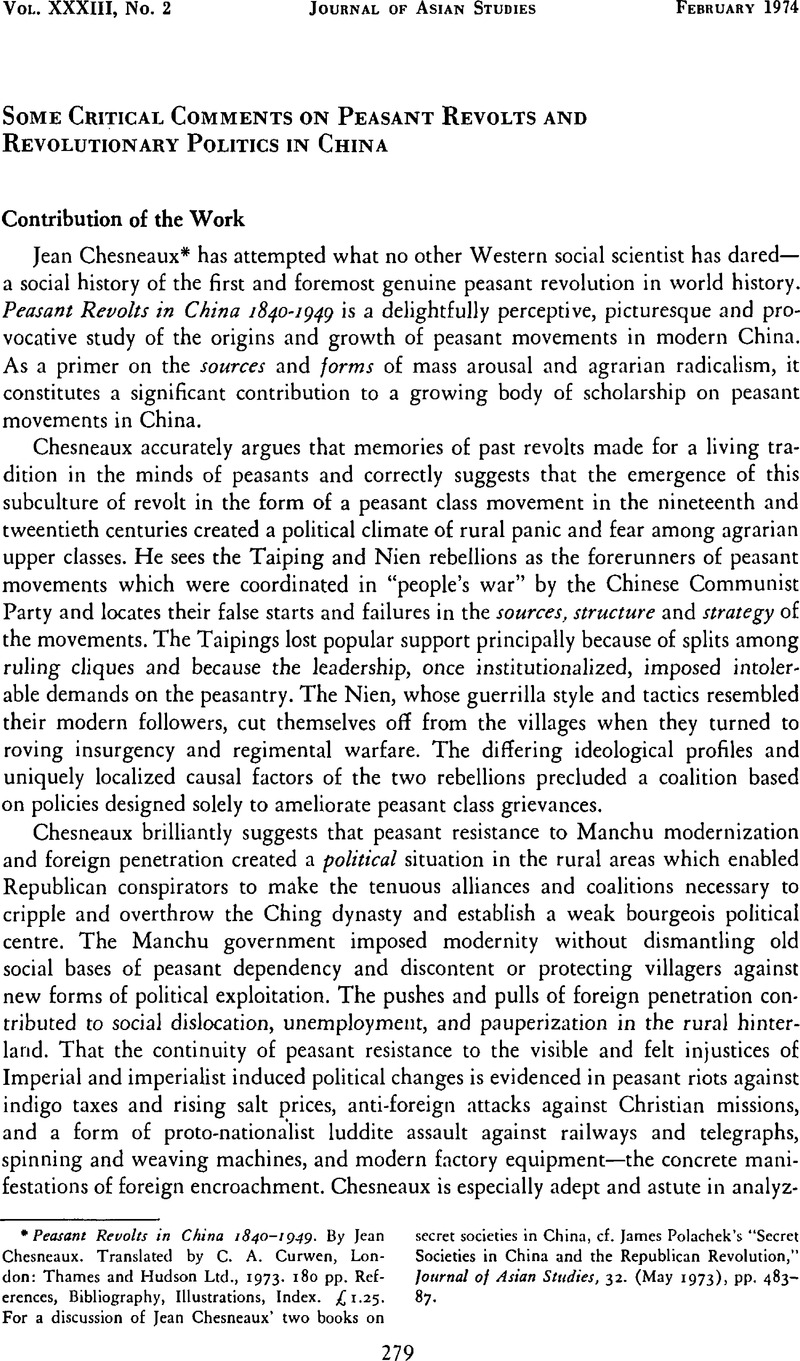Article contents
Some Critical Comments on Peasant Revolts and Revolutionary Politics in China
Published online by Cambridge University Press: 23 March 2011
Abstract

- Type
- Review Articles
- Information
- Copyright
- Copyright © The Association for Asian Studies, Inc. 1974
References
Peasant Revolts in China 1840–1949. By Jean Chesneaux. Translated by C. A. Curwen, London: Thames and Hudson Ltd., 1973. 180 pp. References, Bibliography, Illustrations, Index. £1.25. For a discussion of Jean Chesneaux' two books on secret societies in China, cf. James Polachek's “Secret Societies in China and the Republican Revolution,” Journal of Asian Studies, 32. (May 1973), pp. 483–87.
1 Cf. Kuhn, Philip, Rebellion and Its Enemies in Late Imperial China: Militarization and Social Structure, 1796–1864 (Cambridge: Harvard University Press, 1970), pp. 189–211.Google Scholar
2 Engels, Friedrich, The Peasant War in Germany (New York: International Publishers, 1966).Google Scholar
3 Hobsbawm, E. B., Primitive Rebels (New York: Norton, 1959).Google Scholar
4 Hobsbawm, Eric and Rudé, George, Captain Swing: A Social History of the Great English Agricultural Uprising of 1830 (New York: Pantheon Books, 1968).Google Scholar
5 Schwarz, Henry G., Liu Shao-ch'i and “People's War”: A Report on the Creation of Base Areas in 1938 (Lawrence, Kansas: International Studies, East Asian Research Publication, No. 3. The University of Kansas, 1969), pp. 45–47. 49–5.Google Scholar
6 Johnson, Cf. Chalmers, Peasant Nationalism and Communist Power; The Emergence of Revolutionary China 1937–45 (Stanford: Stanford University Press, 1962);Google ScholarGillin, Donald, Warlord Yen Hsi-shan in Shan si Province 1911–1949 (Princeton, New Jersey: Princeton University Press, 1967);CrossRefGoogle ScholarSelden, Mark, The Yenan Way in Revolutionary China (Cambridge: Harvard University Press, 1971).Google Scholar
7 Johnson, Cf. Chalmers, “Chinese Communist Leadership and Mass Response: The Yenan Period and the Socialist Education Campaign Period,” Ping-ti Ho and Tan Tsou, eds., China in Crisis: China's Heritage and the Communist Political System, Vol. I, Book 1 (Chicago: University of Chicago Press, 1968), pp. 417–421. Johnson seeks to show moderate rural reforms, such as rent and interest reduction, simply acted to reinforce peasant support for CCP policies designed to carry out the war of resistance. Interestingly, Johnson draws the data to support this thesis from a Chinese source which strongly suggests that the CCP reduction of rent and interest was the precondition for peasant participation in war service duties and the cornerstone of CCP success in sustaining mass enthusiasm for the war of resistance. Ch'i Wu cd., I-ko doming ken-chu-ti ti ch'eng-chang: K'ang-Jih chan-cheng ho chieh-fang chan-cheng shih-ch'i It Chin-Chi-Lu-Yn pien-ch'u kai-'kuang (The Growth of A Revolutionary Base: A General Account of the Shansi-Hopei-Shantnng-Honan Border Region during the Anti-Japanese War and the War of Liberation) (Peking: len-min ch'u-pan-she, 1958), pp.116–121.Google Scholar
8 Cf. T'ai-hang jcn-chia (The People oj T'athang) (Peking; Chung-kuo ch'ing-mien ch'u-pan-she, 1964).
9 TV-lung, Mao, Selected Works, Vol. I (Peking: 1967), p. 33.Google Scholar
- 4
- Cited by


